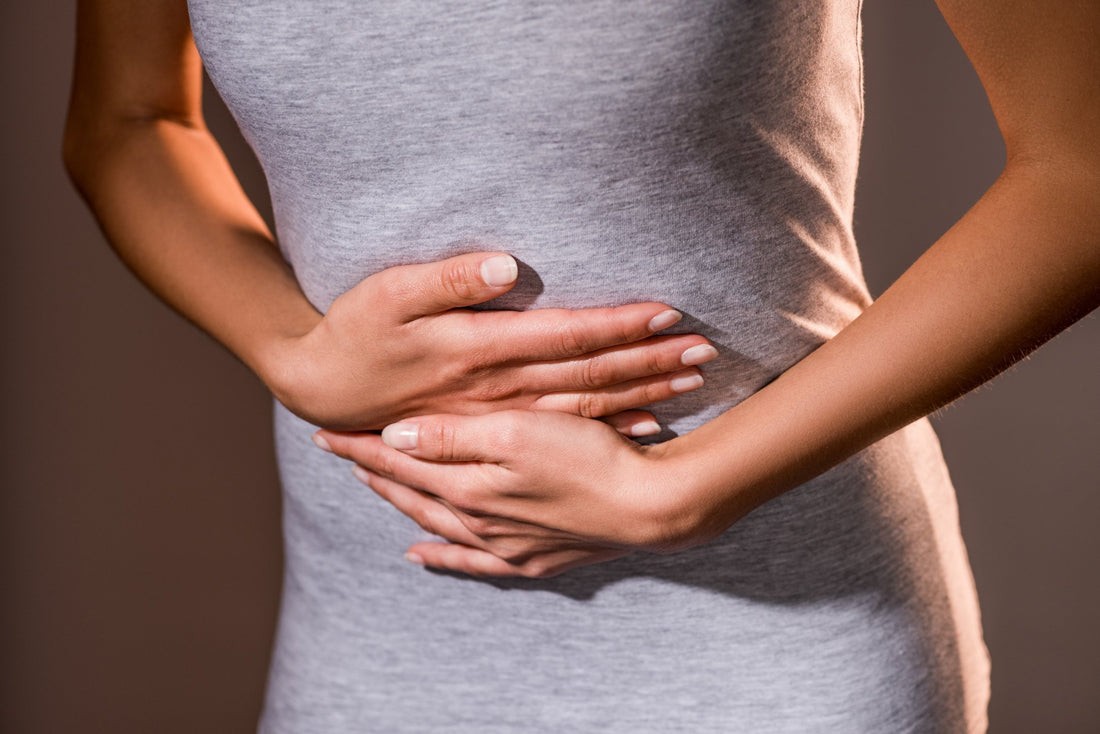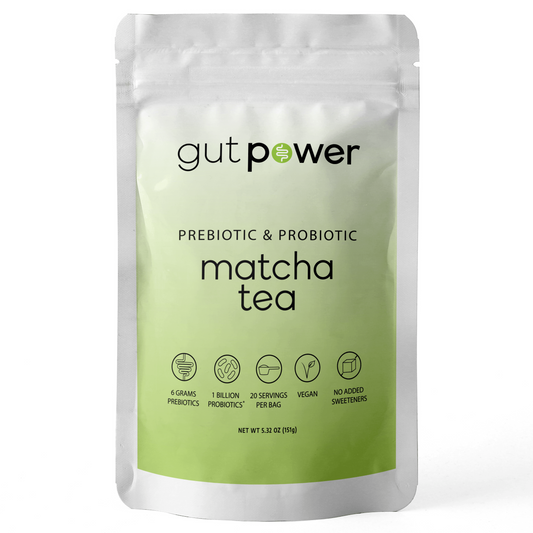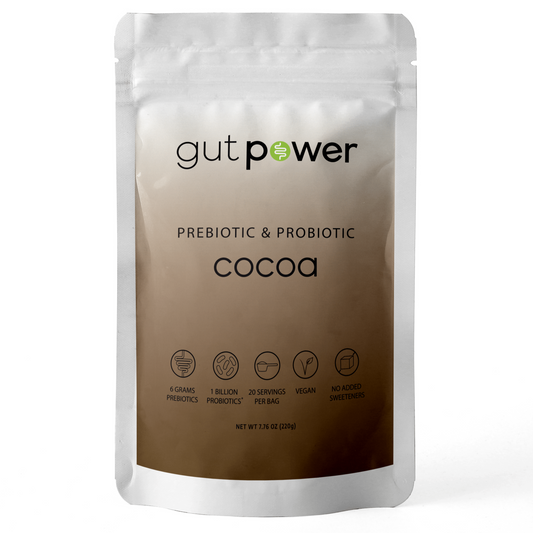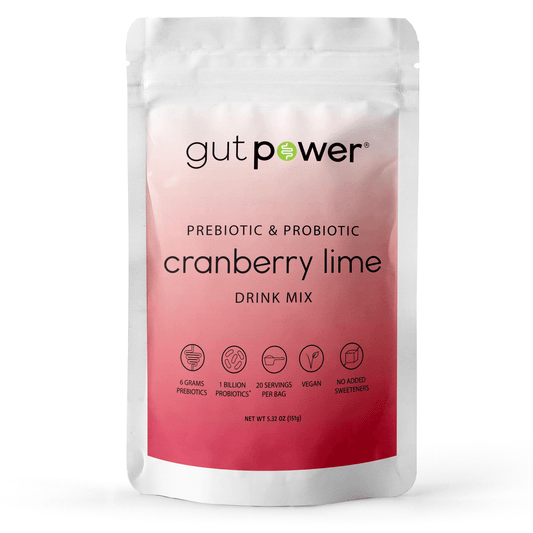So, you’ve given probiotics a shot. You might be wondering what the potential side effects are -- or maybe you’re already experiencing some.
Let’s clear the air. Do probiotics cause gas? If so...why? And can you avoid it?
What are Probiotics?
Probiotics definition: According to the World Health Organization, probiotics are defined as “live microorganisms which when consumed in adequate amounts as part of food confer a health benefit on the host” (1).
That means probiotics are helpful bacteria -- so you can add good bacteria to your gut simply by consuming probiotics. Probiotics can be found in both food and supplements.
How do Probiotics Work?
The Gut Microbiome
You might be wondering why you’d need or want bacteria in your gut in the first place.
Well, probiotic bacteria are necessary for several bodily functions. Good gut bacteria help you digest your food, create vitamins, regulate your immune system, and more.
Not all bacteria in your gut are friendly, however. Sometimes “bad” bacteria can overgrow there, potentially wreaking havoc on your digestion.
We call the collection of microorganisms (like bacteria) living in your gut the gut microbiome. Having too much bad bacteria in your microbiome can cause digestive issues like gas, bloating, and bowel problems.
A balanced microbiome is essential for optimal digestion -- you want the balance to heavily tip toward good bacteria.
If you have overgrowing “bad” bacteria, you have an imbalanced microbiome; researchers call this, “dysbiosis.” Dysbiosis is associated with digestive problems like constipation, diarrhea, bloating, and excess gas.
Adding Probiotics to the Gut Microbiome
Ingesting probiotics adds healthy bacteria to the gut microbiome, which helps improve the balance of good vs bad gut bacteria in a couple ways.
First, by adding probiotics to your routine you are adding beneficial bacteria directly to the microbiome, at least temporarily increasing counts of these useful bacteria in your system.
In addition to this, probiotics actually exert antimicrobial activity against pathogens (“bad” bacteria) in the gut. This means they can help “push” out those bad bacteria, bringing balance back to your gut microbiome.
Rebalancing your gut by taking probiotics may help to alleviate digestive symptoms, especially if your symptoms were caused by an imbalanced gut microbiome in the first place.
Benefits of Probiotics
Balancing your microbiome with probiotics can benefit your body in several ways -- whether that’s improving your digestion, mental health, immunity, or something else.
Probiotics for constipation: Studies show that probiotics may alleviate constipation by improving stool frequency and consistency.
Probiotics for bloating: Dysbiosis can cause improper muscle contraction in your intestines, which in turn can cause bloating (1,2). Certain types of probiotics may combat that chain reaction to ease your bloat (3).
Probiotics for gas: Excess gas is also related to dysbiosis. Addressing dysbiosis with probiotics has been shown to decrease the amount of gas produced in your gut (4).
Probiotics for acid reflux: Acid reflux shows a connection with dysbiosis, as well (5). Rebalancing your microbiome with probiotics may improve reflux symptoms (6, 7).
Probiotics for mental health: The gut microbiome isn’t usually someone’s first thought when experiencing mental health issues. But surprisingly, the microbiome plays a significant role in mental health. Dysbiosis has been shown to increase depression and anxiety (8). Probiotics that address dysbiosis may be able to improve depression and anxiety (9, 10).
Probiotics for the immune system: Probiotics have been found to affect your immune system, as well. (11) They do this by regulating the function of the immune cells.
There are even more benefits to probiotics, including the regulation of autoimmune diseases, skin issues, and more.
The laundry list of potential benefits makes probiotics out to be a miracle pill. But there’s a catch.
Buying any old probiotic at your local drug store will not magically stop your constipation, bloating, gas, and acid reflux all at once. That’s because each strain of probiotic does something different.
It’s important to identify which probiotic strain will help you meet your goal; find a strain that works for your problem specifically.
Do Probiotics Cause Gas?
So we know that probiotics have a lot of benefits...but what if you’re having trouble tolerating yours? Do probiotics cause gas for you?
Unfortunately, probiotics can cause gas, among other side effects like flatulence (farting), bloating, and more. The good news is there are some reasons why this might be happening and ways to fix it.
So, why do probiotics cause gas? Well, changes in your gut microbiota, even if it’s for the better, can lead to potential side effects like gas and bloating -- at first.
Most people do not experience side effects with probiotics -- but if they do, the side effects usually wear off after a few weeks of consistent use (12).
Note your personal food sensitivities when picking out a probiotic as well -- your probiotic might have an allergen in it. If you’re sensitive to dairy, make sure you’re using a dairy-free probiotic.
Dairy free probiotics do exist, though they may be hard to find at your local drug store. Vegan probiotics are out there as well. If that’s what you’re looking for, you just got lucky -- our hot cocoa and matcha tea mixes are non-dairy probiotics.
So yes, probiotics can cause gas (among other probiotic side effects) and it’s somewhat normal at first. Probiotic side effects may include gas, bloating, and headaches -- but they should go away after taking your probiotic consistently for a few weeks.
That said, if your side effects are bothersome, it may be worth trying a new probiotic supplement to see if you tolerate it better (remember, probiotic strains all act differently, so you may do better with one probiotic strain than another).
If you’re worried about potential side effects, start with small doses and work your way up over time. Allowing your body to adjust at first may mitigate the side effects.
What Do I Do If My Probiotic Side Effects are Intense?
While mild side effects like a little bit of gas or bloating are possible when you start taking a probiotic, any side effects you’re experiencing should not be very intense or bothersome.
If your symptoms are severe and do not dissipate, it’s time to talk to a health professional to see what might be going on. Severe side effects from probiotics may be related to significant dysiobis (imbalance) in the gut microbiome that can’t be alleviated with probiotics alone.
You may also want to try a different probiotic product -- something in its contents might be causing a problem for you. Try a non-dairy probiotic if you think you might have issues with dairy (a common ingredient in many probiotics).
It’s also a good idea to check any fillers your supplement may contain, as it’s possible to have an unwanted reaction to those as well. In general, a filler-free probiotic supplement is your best bet!
Bottom Line: Do Probiotics Cause Gas?
Probiotics can cause gas at first, but this effect should wear off with time (usually a few weeks or less). Starting with low doses and working your way up may reduce the intensity of side probiotic side effects.
Also, make sure you’re not sensitive to the probiotic’s contents -- if you suspect that you’re sensitive to dairy, try a dairy-free probiotic.
If your reaction to probiotics is prolonged or severe, talk to a health professional before continuing to take them.





